Shows

The Orthogonal BetEdward Ashton on "After The Fall"In this episode, Samuel Arbesman welcomes back Edward Ashton. Edward is a science fiction writer and the author of numerous novels, including Mickey7, which served as the basis for the film Mickey 17. The two last spoke about Ashton’s novel The Fourth Consort, a compelling first-contact story, and he now returns to discuss his new book, After the Fall.After the Fall is a delightful and thought-provoking novel set on a post-apocalyptic Earth where an alien civilization has settled on the planet and domesticated humans. Despite the premise, the book is surprisingly fun and fu...
2026-02-2537 min
The Orthogonal BetLori Emerson on the Media Archaeology LabIn this episode, Samuel Arbesman speaks with Lori Emerson, a professor of Media Studies at University of Colorado Boulder and the founding director of the Media Archaeology Lab, where Arbesman serves as an advisor. Emerson’s work sits at the crossroads of media, technology, and history—a perspective embodied by the Lab’s hands-on approach to preserving older technologies and keeping them alive through use, not just observation.The conversation also explores Emerson’s recent book, Other Networks: A Radical Technology Sourcebook, which treats the idea of the “network” as something far older and stranger than the modern internet. Drawing on e...
2026-02-1947 min
The Orthogonal BetBrendan Schlagel on Learning CommunitiesIn this episode, Samuel Arbesman speaks with Brendan Schlagel, a builder obsessed with learning and community, and the cofounder of Hyperlink and Leaflet—projects devoted to helping people learn together and share knowledge in public.Samuel and Brendan trace the history of Hyperlink and the learning communities it sparked, and how that work ultimately led to Leaflet: a tool designed to make publishing and sharing online feel effortless again. Along the way, they explore learning and education, the strange power of lists, personal canons, antilibraries, practical advice for connection (online and off), and even wh...
2026-02-1139 min
The Orthogonal BetGordon Brander on Scenario PlanningIn this episode, Samuel Arbesman speaks with Gordon Brander, a technologist and researcher currently building Deep Future, an AI tool designed to facilitate scenario planning. Gordon has worked in design and engineering at organizations including Mozilla and Google, where he used scenario planning in practice—and he’s now aiming to democratize the framework more broadly.Together, Samuel and Gordon explore the history and mechanics of scenario planning: what it is, how it works, and what it’s actually useful for. They dig into risk versus uncertainty, epistemic humility, and Knightian uncertainty, along with the re...
2026-02-0444 min
The Orthogonal BetFlorian Jehn on Summarizing Collapse ResearchIn this episode, Samuel Arbesman speaks with Florian Jehn, a researcher who studies the nature of societal collapse and the author of the blog Existential Crunch. Existential Crunch examines and summarizes scientific work in this space, serving as a living literature review of research on societal collapse.Samuel and Florian discuss the origins of Existential Crunch, the radically interdisciplinary nature of collapse studies, and how the field cuts across domains—from the statistical study of history and the rise and fall of civilizations to catastrophic and existential risk, and the mechanics of societal resilience. Th...
2026-01-2843 min
The Orthogonal BetDexter Palmer on Writing Literary Fiction with Sci-Fi TropesIn this episode, Samuel Arbesman speaks with novelist Dexter Palmer, the author of three books that deliberately resist easy categorization. As they discuss, Palmer’s work can be thought of as literary fiction infused with science-fictional tropes and textures. His debut, The Dream of Perpetual Motion, is a kind of steampunk tale; Version Control explores a near-future world with dollops of time travel; and Mary Toft; or, The Rabbit Queen is historical fiction drawn from the real 18th-century case of a woman who claimed—falsely—to be giving birth to rabbits.Together, Arbesman and Palmer...
2026-01-2148 min
The Orthogonal BetStuart Buck on "The Case for Crazy Philanthropy"In this episode, Samuel Arbesman speaks with Stuart Buck, executive director of the Good Science Project—a think tank devoted to better understanding how science is done and funded. Stuart previously served as a vice president at Arnold Ventures, where he focused (among other things) on scientific practice and reproducibility, and he holds a PhD in education policy and a JD. Stuart also wrote a fascinating essay last year for Palladium Magazine titled “The Case for Crazy Philanthropy,” and Samuel wanted to explore the idea with him.Together, they discuss the nature and history of “cr...
2026-01-1441 min
The Podcast BrowserAlec Nevala-Lee on Luis Alvarez Podcast: The Orthogonal BetEpisode: Alec Nevala-Lee on Luis AlvarezPub date: 2025-11-05Get Podcast Transcript →powered by Listen411 - fast audio-to-text and summarizationIn this episode, Samuel Arbesman speaks again with Alec Nevala-Lee. Arbesman previously hosted Nevala-Lee to discuss his biography of Buckminster Fuller; this time, Nevala-Lee returns to talk about his new book, Collisions, a biography of Nobel Prize–winning physicist Luis Alvarez. Alvarez’s career ranged across particle physics, the Manhattan Project, the investigation of the JFK assassination, and—alongside his son—the asteroid-impact theory of dinosaur e...
2025-11-1847 min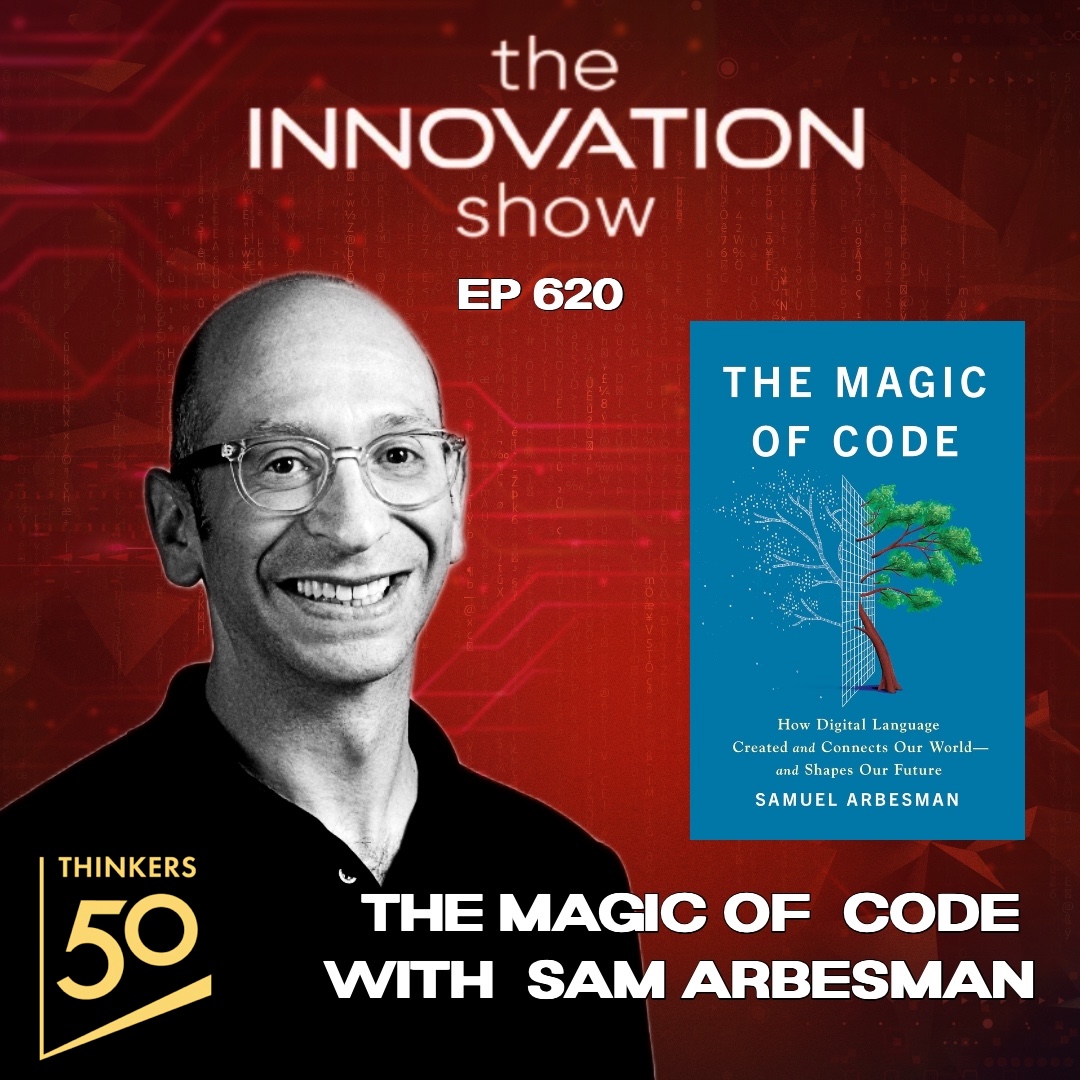
The Innovation ShowThe Magic of Code with Sam Arbesman | The Innovation Show (Thinkers50 Award-Winning Podcast)In this thought-provoking episode, Aidan McCullen — Thinkers50 Innovation Award Winner, author of Undisruptable, and host of The Innovation Show — welcomes Samuel Arbesman, scientist, author, and polymath, for the grand finale of their trilogy. Together, they explore The Magic of Code: How Digital Language Created and Connects Our World, diving deep into how code shapes our understanding of reality — from biology and evolution to artificial intelligence and the simulation hypothesis. Discover how code is the new DNA, the universal language linking art, philosophy, and technology, and why rekindling curiosity, humility, and wonder is essential in our age of...
2025-11-0559 min
The Orthogonal BetAlec Nevala-Lee on Luis AlvarezIn this episode, Samuel Arbesman speaks again with Alec Nevala-Lee. Arbesman previously hosted Nevala-Lee to discuss his biography of Buckminster Fuller; this time, Nevala-Lee returns to talk about his new book, Collisions, a biography of Nobel Prize–winning physicist Luis Alvarez. Alvarez’s career ranged across particle physics, the Manhattan Project, the investigation of the JFK assassination, and—alongside his son—the asteroid-impact theory of dinosaur extinction.Arbesman and Nevala-Lee explore how Nevala-Lee first became interested in Alvarez; the physicist’s unique skills, brilliance, and difficult personality; the character of Berkeley and the Rad Lab in Alv...
2025-11-0547 min
The Orthogonal BetNick Foster on "Could Should Might Don’t"In this episode, Samuel Arbesman speaks with Nick Foster, a designer and futurist who has worked with numerous major companies imagining a variety of futures—from Nokia and Dyson to Google. Foster is also the author of the new book Could Should Might Don’t, which explores the many ways we do and can think about the future.Arbesman and Foster discuss how Foster found his way into the world of futures thinking and the nature of futures design work within organizations. Their conversation covers Foster’s taxonomy of different kinds of futures design, the im...
2025-10-2955 min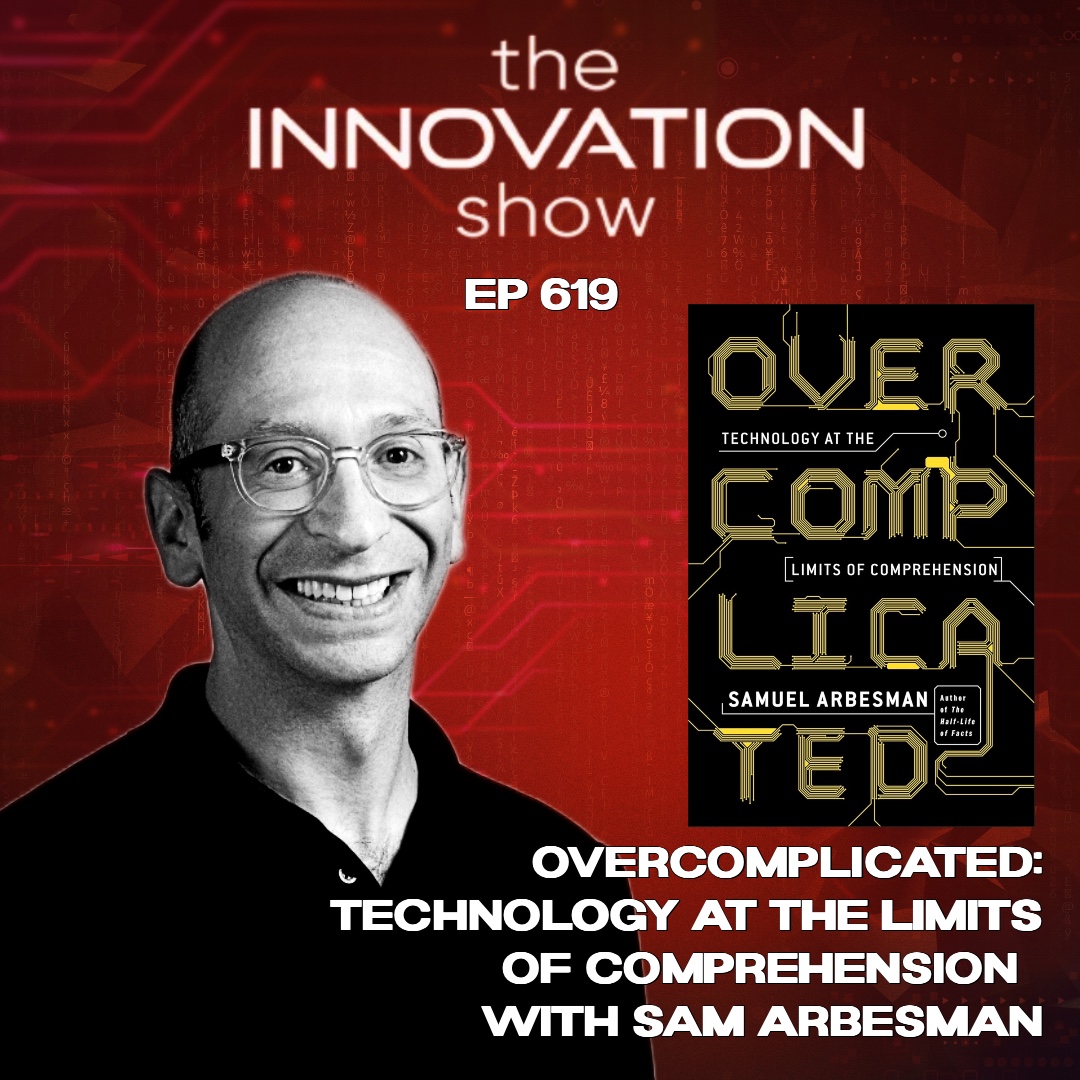
The Innovation ShowUnderstanding the Complexity of Modern Technology with Samuel Arbesman | OvercomplicatedIn this episode, we explore the intricate world of modern technology with Samuel Arbesman, author of Overcomplicated: Technology at the Limits of Comprehension. Why did the New York Stock Exchange shut down in 2015? What caused Toyota vehicles to accelerate without warning? Samuel reveals how technological "accretion" and interconnected systems create outcomes that even developers, engineers, and executives can't predict. We discuss: Why technology often evolves beyond human comprehension How "spaghetti code" and legacy systems create systemic risk The biological limits of human understanding Generalists vs. specialists in...
2025-10-2759 min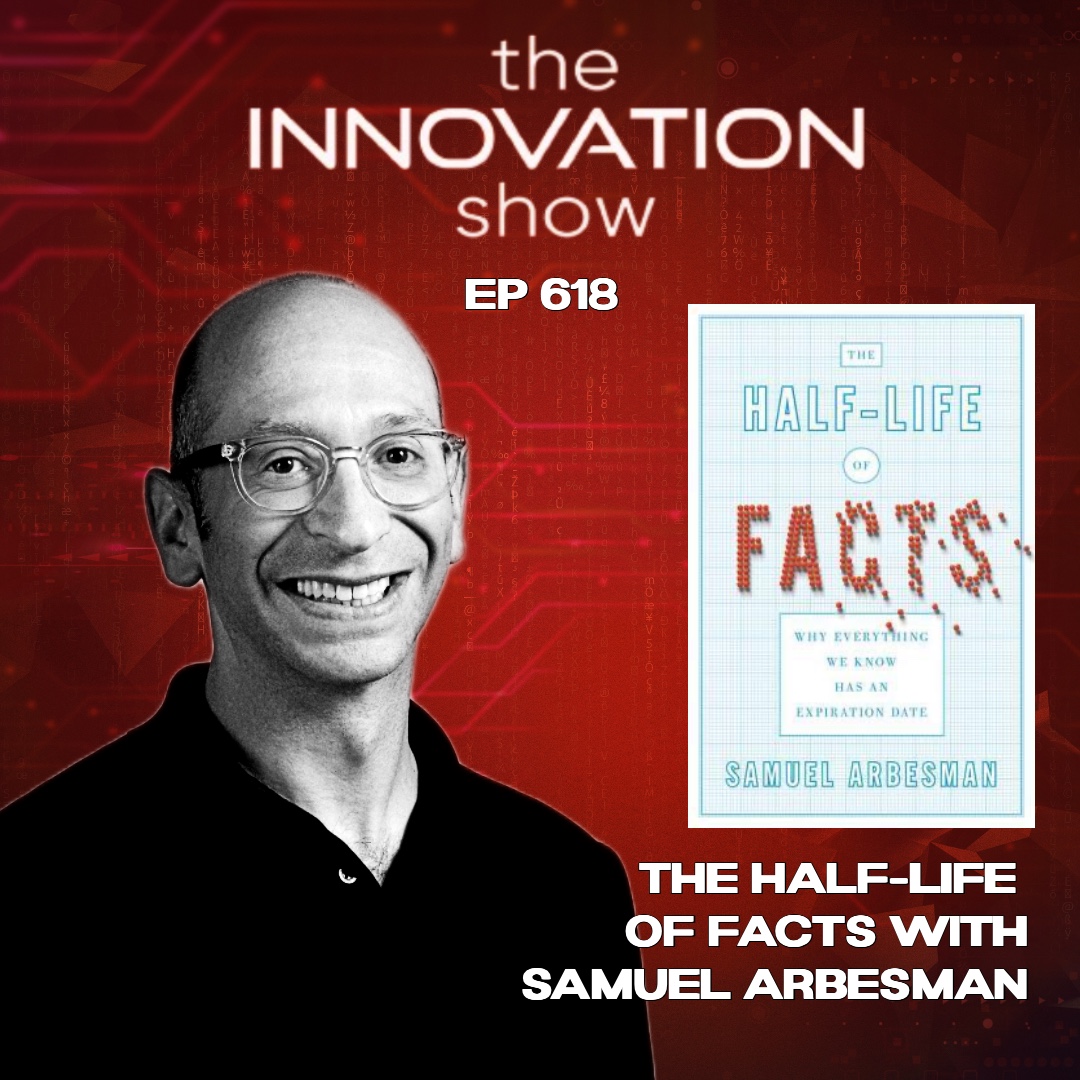
The Innovation ShowThe Half-Life of Facts with Samuel Arbesman: Why Knowledge Keeps ChangingFacts change — and that's a good thing. In this episode, Samuel Arbesman, complexity scientist and author of The Half-Life of Facts, joins Aidan McCullen to explore how what we know — and believe to be true — constantly evolves. Together, they unpack how facts have a "half-life," why collaboration matters in a changing world, and how exponential knowledge growth reshapes science, strategy, and society. In this episode: Why facts and truths decay over time How science self-corrects — from the Brontosaurus myth to the spinach iron story The concept o...
2025-10-221h 09
The Orthogonal BetDavid Edmonds on Death in a Shallow PondIn this episode, Samuel Arbesman speaks with David Edmonds, cohost of the Philosophy Bites podcast and bestselling author of numerous books on philosophy, including his most recent work, Death in a Shallow Pond: A Philosopher, A Drowning Child, and Strangers in Need. In this delightful book, Edmonds explores Peter Singer’s famous “shallow pond” thought experiment—its moral implications, its influence, and how it gave rise to the Effective Altruism movement. The result is a fascinating biography of an idea and a penetrating analysis of its ripple effects through ethics and action.Arbesman and Edmonds...
2025-10-2249 min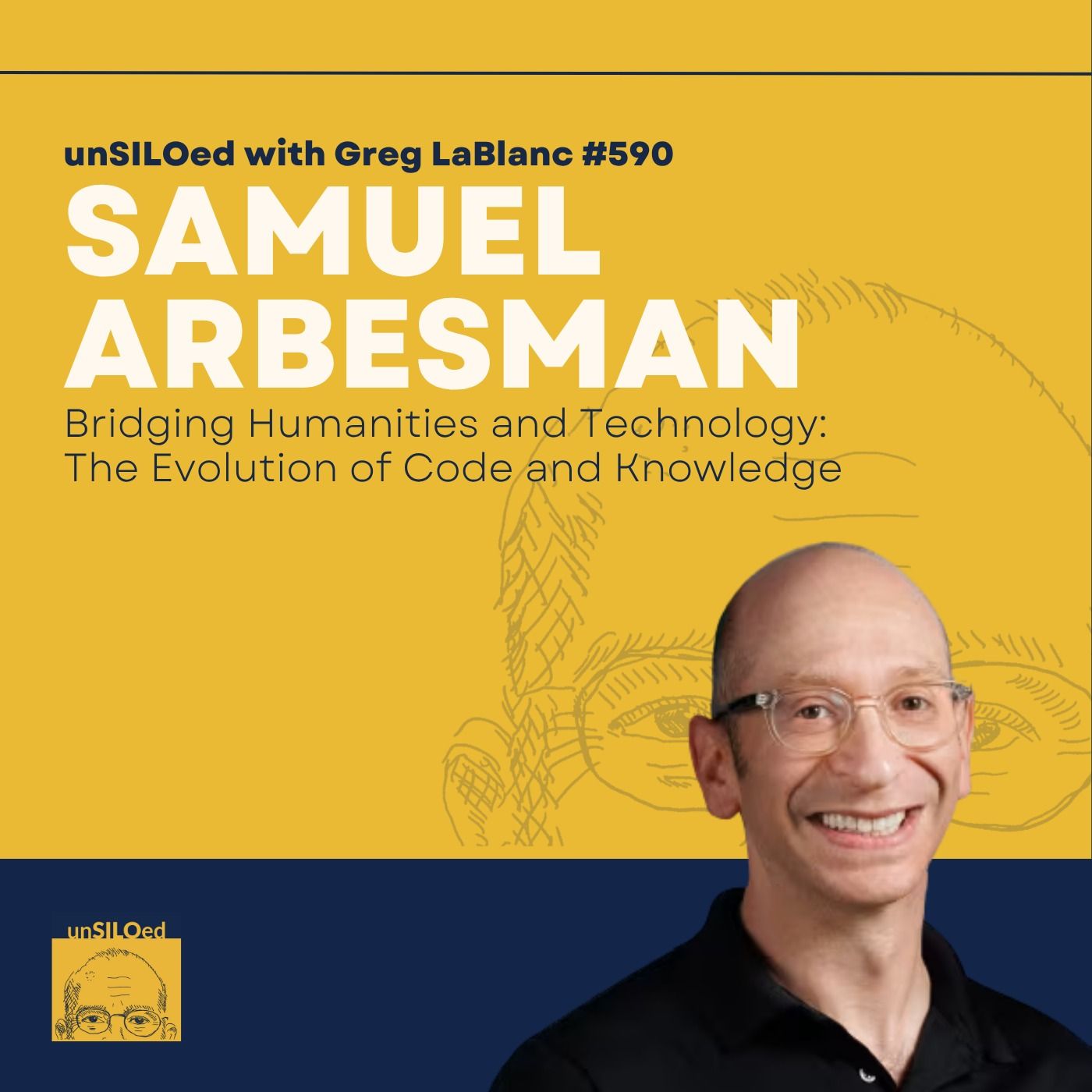
unSILOed with Greg LaBlanc590. Bridging Humanities and Technology: The Evolution of Code and Knowledge feat. Samuel ArbesmanHow does code, like language, shape the way we see the world? How can we rediscover enchantment in our technology?? How can we determine the half-life of knowledge as we continue to learn and discover new things?Samuel Arbesman is a scientist in residence at Lux Capital, a fellow at Case Western School of Management, and the author of three books, The Magic of Code: How Digital Language Created and Connects Our World—and Shapes Our Future, Overcomplicated: Technology at the Limits of Comprehension, and The Half-Life of Facts: Why Everything We Know Has an Expiration Date....
2025-10-2056 min
The Orthogonal BetRohit Krishnan on Training AI to Write Bettern this episode, Samuel Arbesman speaks with Rohit Krishnan, one of the most playful and insightful thinkers in the world of ideas. Rohit writes Strange Loop Canon, a newsletter devoted to exploring delightfully wide-ranging concepts—including artificial intelligence. He also recently collaborated with Jon Evans on Walter, a project that trained an AI to be good at social media.Together, Samuel and Rohit discuss Walter and the curious question of why large language models remain so poor at good writing, despite being built around text. Their conversation branches into topics such as reinforcement learning fo...
2025-10-1553 min
Clearer Thinking with Spencer GreenbergDo facts have an expiration date? (with Samuel Arbesman) Read the full transcript here. What does it mean to treat facts as drafts rather than monuments? If truth is something we approach, how do we act while it’s still provisional? When definitions shift, what really changes? How do better instruments quietly rewrite the world we think we know? Are we mostly refining truths or replacing them? When do scientific metaphors clarify and when do they mislead? What public stories make self-correction legible and trusted? What features make science self-correct rather than self-congratulatory? How should we reward replication, repair, and tool-building? Do we need more generalists...
2025-10-091h 15
The Orthogonal BetLinda Liukas on Teaching Kids to Code Through PlayIn this episode, Samuel Arbesman speaks with Linda Liukas, author of the beloved Hello Ruby children’s book series about computers, as well as a new Finnish-language book for adults on computing. Liukas also recently designed a playground in Helsinki that introduces children to foundational ideas in computer science through play.Together, Arbesman and Liukas explore her path to becoming a children’s book author, how to cultivate curiosity, and the appeal of generative AI. Their conversation ranges across educational philosophies, playground design, and the relationship between play and curiosity. They also delve into the...
2025-10-0848 min
The Orthogonal BetMolly Mielke on What Makes a Founder Worth Betting OnIn this episode, Samuel Arbesman speaks with Molly Mielke. Despite her youth, Molly has already built a fascinating career across tech—spending time at Notion, Figma, Stripe, and the Browser Company—before launching her own venture fund, Moth Fund. Along the way, she’s learned a great deal about herself and thought deeply about the role of technology in the world.Arbesman and Mielke discuss her career so far, why she chose to move into venture, how she evaluates and supports people—whether through startup investments or grants—and the kinds of builders and thinkers w...
2025-10-0146 min
Spoiler Alert: Everyone DiesThe Eighth Wonder of the World is on Your Phone - The Magic of Code (Samuel Arbesman)Code. To most of us, it's that terrifying block of text that looks like a cat fell asleep on a keyboard. We see it as a cold, robotic language for machines, but what if it's actually one of the most creative, collaborative, and magical human endeavors of all time? Based on Samuel Arbesman's "The Magic of Code," this video peels back the curtain on our digital world. We explore how simple TRUE/FALSE logic builds entire universes, how programmers collaborate like artists in a global studio, and how a few lines of math can generate infinite and beautiful landscapes...
2025-09-2909 min
The Orthogonal BetDaniel Temkin on Esoteric Programming LanguagesIn this episode, Samuel Arbesman speaks with Daniel Temkin, a writer and artist working in the digital art space who has been creating strange and provocative programming languages for years. These “esoteric languages” or “esolangs” [esso] explore the limits and breadth of what programming and code can be. Temkin recently released a book collecting languages he created, titled Forty-Four Esolangs, a work that is both wild and fascinating.Together, Arbesman and Temkin explore the nature of esolangs, the benefits of playful constraints, how to think about programming languages more broadly, code poetry, the balance between...
2025-09-2446 min
The Orthogonal BetParker Owens on Parker's Brick BuildsIn this episode, Samuel Arbesman speaks with Parker Owens, whose passion for Lego has grown into something remarkable. In addition to working as an attorney, Parker runs Parker’s Brick Builds, a company where he designs and sells custom Lego creations. His sets range from vehicles and a siege tower to even a Lego “dumpster fire” that fans can build themselves.Arbesman and Owens explore Parker’s Lego journey—from childhood play, through a hiatus during his young adult years, to rediscovering the bricks and eventually becoming a Lego TikTok star. Their conversation covers the origin...
2025-09-1745 min
New Books in TechnologySamuel Arbesman, "The Magic of Code: How Digital Language Created and Connects Our World—and Shapes Our Future" (PublicAffairs, 2025)In the tradition of classics such as The Lives of a Cell, a bold reframing of our relationship with technology that argues code is "a universal force--swirling through disciplines, absorbing ideas, and connecting worlds" (Linda Liukas).
In the digital world, code is the essential primary building block, the equivalent of the cell or DNA in the biological sphere--and almost as mysterious. Code can create entire worlds, real and virtual; it allows us to connect instantly to people and places around the globe; and it performs tasks that were once only possible in science fiction. It is a s...
2025-09-131h 10
New Books in Science, Technology, and SocietySamuel Arbesman, "The Magic of Code: How Digital Language Created and Connects Our World—and Shapes Our Future" (PublicAffairs, 2025)In the tradition of classics such as The Lives of a Cell, a bold reframing of our relationship with technology that argues code is "a universal force--swirling through disciplines, absorbing ideas, and connecting worlds" (Linda Liukas).
In the digital world, code is the essential primary building block, the equivalent of the cell or DNA in the biological sphere--and almost as mysterious. Code can create entire worlds, real and virtual; it allows us to connect instantly to people and places around the globe; and it performs tasks that were once only possible in science fiction. It is a s...
2025-09-131h 10
New Work in Digital HumanitiesSamuel Arbesman, "The Magic of Code: How Digital Language Created and Connects Our World—and Shapes Our Future" (PublicAffairs, 2025)In the tradition of classics such as The Lives of a Cell, a bold reframing of our relationship with technology that argues code is "a universal force--swirling through disciplines, absorbing ideas, and connecting worlds" (Linda Liukas).
In the digital world, code is the essential primary building block, the equivalent of the cell or DNA in the biological sphere--and almost as mysterious. Code can create entire worlds, real and virtual; it allows us to connect instantly to people and places around the globe; and it performs tasks that were once only possible in science fiction. It is a s...
2025-09-131h 10
The Orthogonal BetKristoffer Tjalve on The Internet Phone BookSamuel Arbesman is joined once again by Kristoffer Tjalve. The two previously spoke about the poetic web and the delightful aspects of the internet. This time, Kristoffer shares his new project: the Internet Phone Book—a physical book that lists personal websites alongside essays about the internet. After selling out its first run, the book is now available again as a reprint from Metalabel.In their conversation, Arbesman and Tjalve discuss the origins and nature of the Internet Phone Book, the spirit of the early web it seeks to recapture, and the lessons Kristoffer learned while making it...
2025-09-1048 min
The Orthogonal BetEdward Ashton on The Fourth ConsortIn this episode, Samuel Arbesman speaks with Edward Ashton. Edward Ashton is a science fiction writer and the author of numerous novels, including Mickey7, which became the basis for the movie Mickey 17. His most recent novel is The Fourth Consort, a fascinating first contact story that touches upon many different topics, from humanity’s uniqueness to how to think about interstellar confederations.Arbesman and Ashton discuss the origins of The Fourth Consort, the science fiction features Ashton was playing with and subverting, and why science fiction shouldn’t simplify alien species or human beings. They...
2025-09-0343 min
The Orthogonal BetNeal Agarwal on neal.funIn this episode, Samuel Arbesman speaks with Neal Agarwal. Neal has been building online playthings for most of his life. He runs neal.fun, which many listeners may already be familiar with, home to such games and internet toys as Infinite Craft and Internet Roadtrip. For example, Infinite Craft begins with the four elements of earth, air, fire, and water, which can be recombined in open-ended ways to build almost anything: water plus earth yields plant; plant plus fire equals smoke; smoke plus fire equals volcano—and then you’re off to the races. These websites are delightful, strange, and...
2025-08-2742 min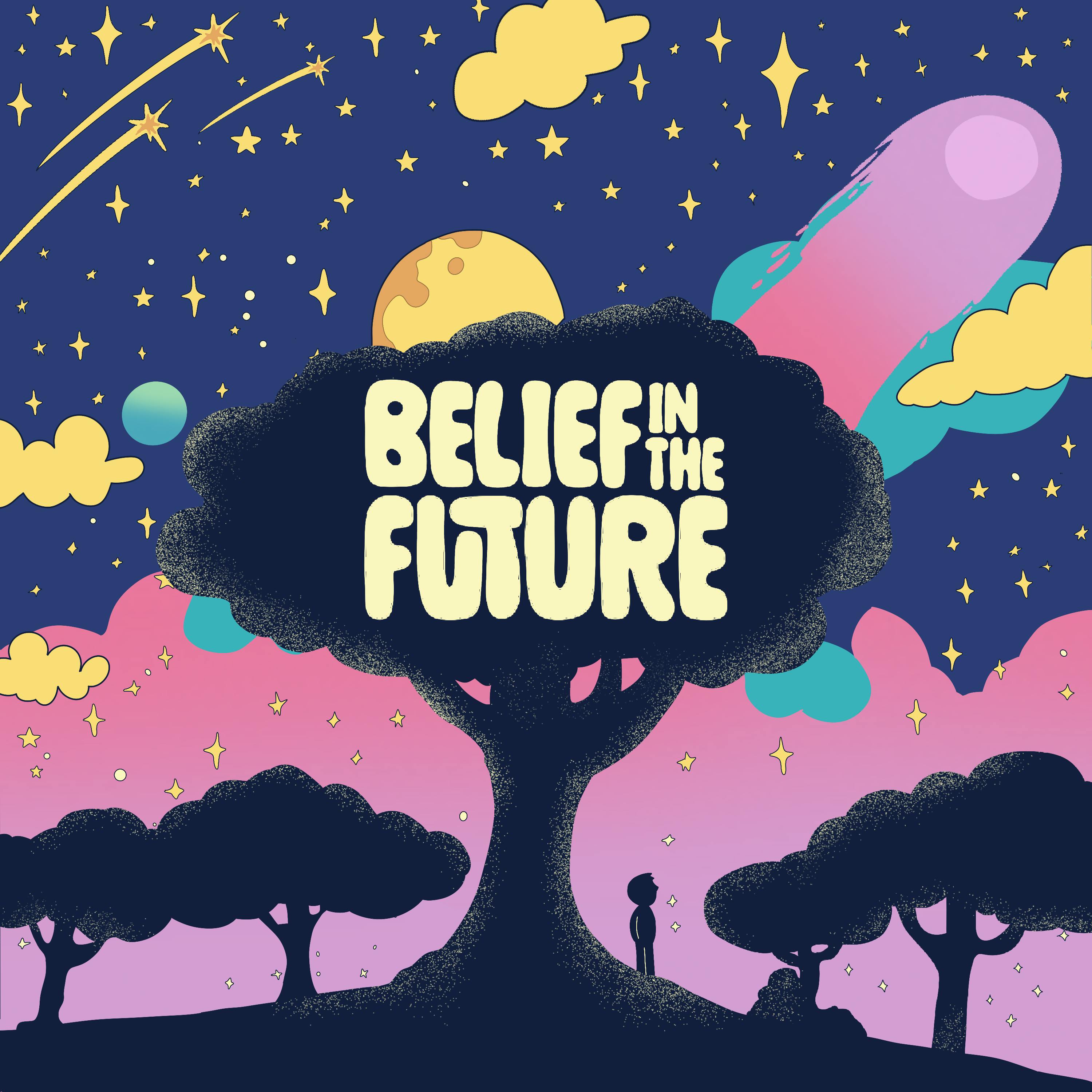
Belief in the FutureThe Two CodesBIG NEWS: Belief in the Future now has a YouTube channel: Sabbath Mode. Go check it out before listening to the episode Coding is one part skill, one part magic, and one part tradition. But when AI use takes out the conversation of code -- the necessary language of the code itself -- can the tradition be kept alive? How do we keep something living and growing without passing along its stories, its trials and errors, and its complexities? On this episode, host David Zvi Kalman speaks with scientist Samuel Arbesman about his new book, The Magic of Code, an...
2025-08-2033 min
The Orthogonal BetJulian Gough on the Evolution of UniversesIn this episode, Samuel Arbesman speaks with Julian Gough — a writer, musician, and now researcher in cosmology. Julian was part of Toasted Heretic, an Irish rock group, has written novels for both children and adults, and even composed Minecraft’s end poem. More recently, he has turned his attention to cosmology, exploring ideas at the intersection of evolution and universe formation to better understand why the cosmos is the way it is. He writes about this work in his newsletter The Egg and the Rock, where he argues that “our universe appears to be the result of an evolutionary proces...
2025-08-2052 min
The Orthogonal BetÉtienne Fortier-Dubois on Tech TreesIn this episode, Samuel Arbesman speaks with Étienne Fortier-Dubois, a writer and programmer whose work has appeared in publications such as Asterisk Magazine and Works in Progress. He also authors the newsletter Hopeful Monsters. With a vast and eclectic set of interests—from the intricate details of technological history to the sweeping arcs of human civilization—Fortier-Dubois recently created The Historical Tech Tree, a website mapping the vast interconnections and interdependencies of technological advances across millions of years.Arbesman and Fortier-Dubois delve into the concept of a tech tree (and its connections to the game...
2025-08-1341 min
The Orthogonal BetEvan Armstrong on Launching The Leverage and Rethinking Tech MediaIn this episode, Samuel Arbesman speaks with Evan Armstrong, the writer behind The Leverage, a newsletter devoted to exploring and explaining the rapid changes in technology markets. Before launching his own publication, Evan was the lead writer at Every, where he helped grow the platform to over 100,000 subscribers.Samuel and Evan discuss Evan’s path to writing and what it takes to build a new tech publication in today’s evolving media landscape. Evan shares his taxonomy of tech media publications, his thoughts on the nature of newsletters, and the kind of writing he beli...
2025-07-3046 min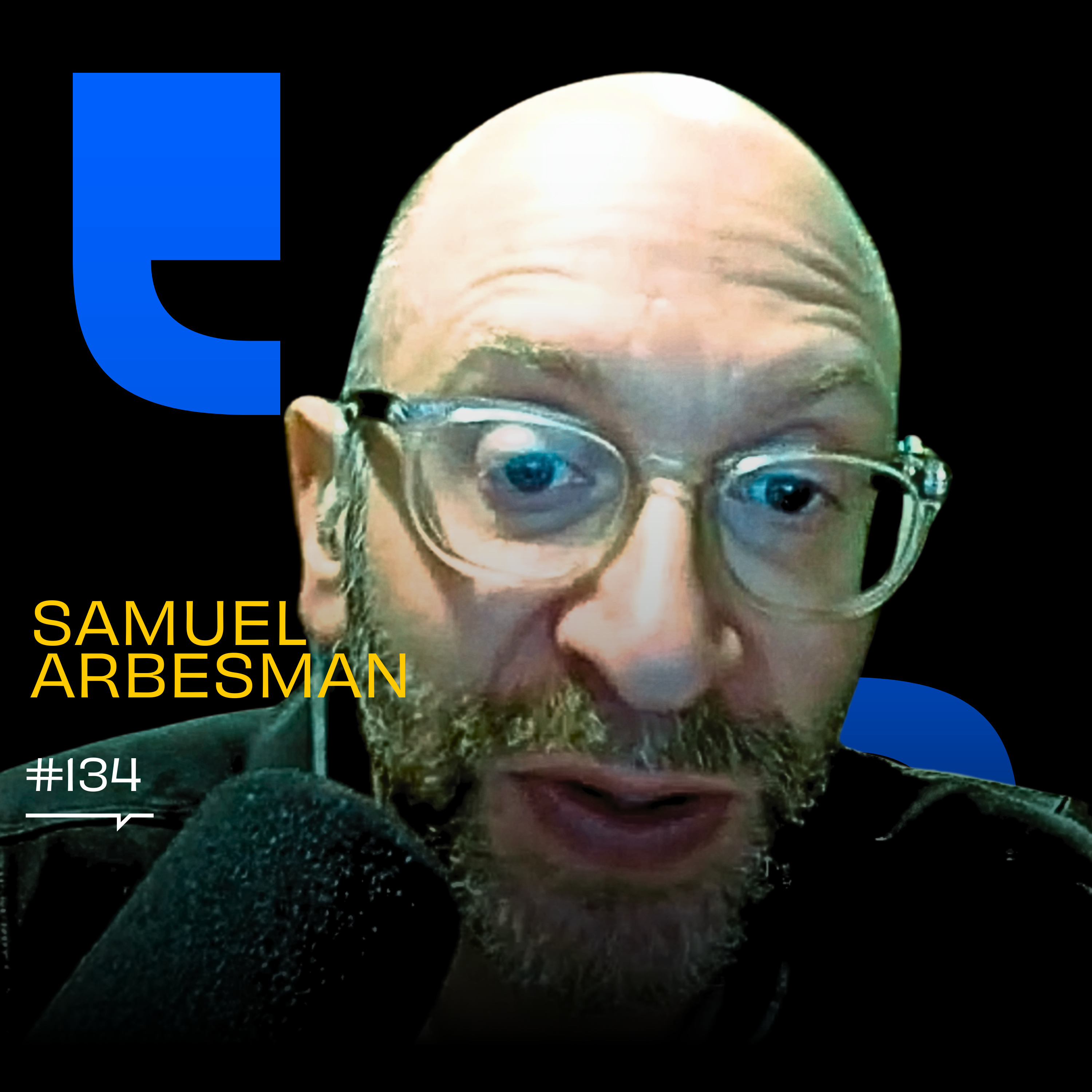
Through ConversationsAI, Creativity & the Future of Technology – Samuel ArbesmanIn this conversation, Samuel Arbesman discusses the evolving nature of knowledge, the role of AI in enhancing creativity, and the concept of technology as a 'bicycle for the mind.' Samuel Arbesman is a complexity scientist and author exploring the intersections of technology, science, and culture. He is the author of The Half-Life of Facts and Overcomplicated, as well as The Magic of Code. Samuel serves as Scientist-in-Residence at Lux Capital, where he investigates emergent trends shaping our future.Chapters00:00 The Half-Life of Knowledge07:07 AI...
2025-07-2846 min
The Orthogonal BetGabe Henry on "Enough is Enuf"In this episode, Samuel Arbesman sits down with writer Gabe Henry, whose latest book Enough is Enuf delves into the long-running crusade to simplify English spelling (note the purposeful “ENUF” in the title). Everyone senses that English orthography can feel downright irrational, yet spelling-reform campaigns often make readers bristle. Henry unpacks those efforts—missteps, breakthroughs, and all.Together, Arbesman and Gabe trace the tangled roots of English irregularity, explore past attempts to tame it, and spotlight the luminaries who tried: Benjamin Franklin, Noah Webster, Melvil Dewey, Teddy Roosevelt, and more. Their conversation weighs the case for and agains...
2025-07-2339 min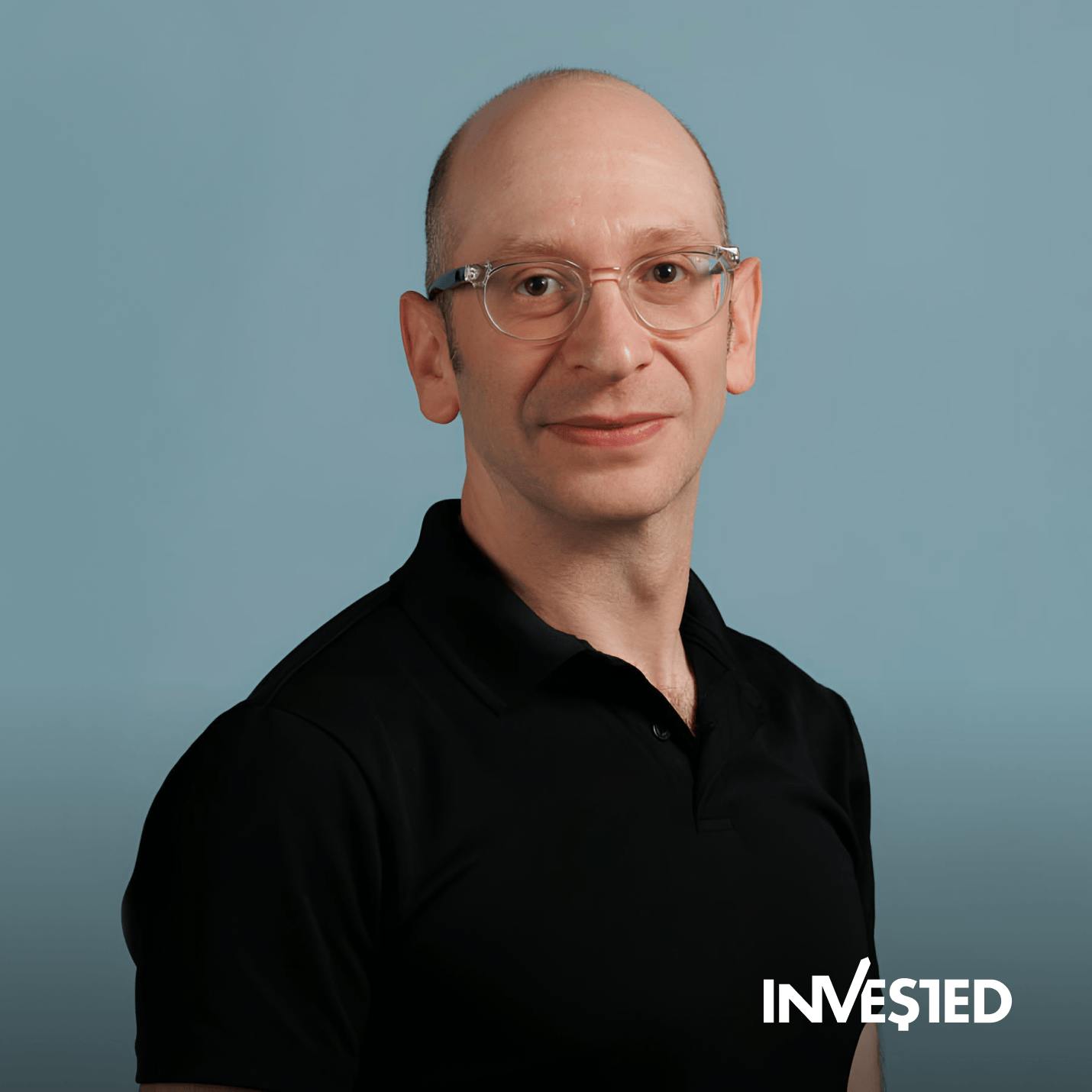
Invested by AlephFrom DNA to Star Trek: Samuel Arbesman on Reconciling Science with Tradition, Building Personalized “Sims” for Your Body, and What it Means to be a Scientist in VCOn this episode of Invested, Michael hosts Samuel Arbesman, the Scientist in Residence at Lux Capital. In addition, he is an xLab senior fellow at Case Western Reserve University’s Weatherhead School of Management and a research fellow at the Long Now Foundation. He is the author of The Magic of Code, Overcomplicated, and The Half-Life of Facts, and his writing has appeared in such places as the New York Times, Wall Street Journal, The Atlantic, and Wired, where he was previously a contributing writer. He lives in Cleveland with his family. The first computer he used was a Co...
2025-07-161h 12
The Orthogonal BetDaryl Gregory on Simulation Theory and the Great American Glitch TourIn this episode, host Samuel Arbesman sits down with novelist Daryl Gregory, celebrated author of numerous science-fiction and fantasy works—including the newly released When We Were Real. Set seven years after humanity discovers that reality is a vast computer simulation, Gregory’s novel follows a cross-country bus tour of Americans seeking out the strangest “glitches” in their digital world. The story is wild, uncanny, and irresistibly imaginative—exactly the sort of narrative Arbesman is eager to unpack with its creator.Together, Arbesman and Gregory trace the book’s origins and intricate world-building, delving into the unu...
2025-07-1638 min
The Orthogonal BetKenneth Stanley on the Disruptive Power of Open-EndednessIn this episode, Samuel Arbesman speaks with Kenneth Stanley, a renowned computer scientist and AI researcher whose career spans academia, industry, and startup innovation. Stanley has been a professor, a cofounder of multiple companies, and a researcher at both OpenAI and Uber. He currently serves as the Senior Vice President of Open-Endedness at Lila Sciences. He is also the coauthor of Why Greatness Cannot Be Planned: The Myth of the Objective, a widely praised book exploring the nature of creativity and discovery.Arbesman and Stanley discuss the nuances of conducting research across a variety...
2025-07-0950 min
The Orthogonal BetAlec Nevala-Lee on Buckminster FullerIn this episode, Samuel Arbesman sits down with Alec Nevala-Lee, author of numerous books, including Inventor of the Future, a definitive biography of Buckminster Fuller.Buckminster Fuller was an architect, designer, and public intellectual whose influence stretched far beyond blueprints and prototypes. Later in life, he became a lodestar for the counterculture, inspiring the pages of the Whole Earth Catalog and leaving fingerprints all over what would become Silicon Valley’s ethos.In his biography, Nevala-Lee unravels Fuller’s contradictions — a visionary who struggled to succeed yet profoundly shaped cultur...
2025-06-2548 min
The Orthogonal BetEliot Peper on developing lore around AI agentsIn this episode of The Orthogonal Bet, host Samuel Arbesman welcomes back return guest Eliot Peper. Eliot is a science fiction writer and the author of numerous books, and is currently collaborating with the tech company Portola, which is developing Tolans — AI friends and companions that blur the line between lore and code.Samuel and Eliot delve into how Eliot found himself shaping the mythos behind these AI agents, exploring how crafting lore for artificial minds differs from telling stories for human ones. Their conversation expands into the nature of narrative itself: what humans un...
2025-06-1854 min
The Jim Rutt ShowEP 304 Samuel Arbesman on The Magic of CodeJim talks with Samuel Arbesman about the ideas in his book The Magic of Code: How Digital Language Created and Connects Our World—and Shapes Our Future. They discuss Sam's motivation for writing the book, the wondering vs. utilitarian stances toward computing, early personal computing experiences, scale in programming, AI as a "hinge of history" moment, the democratization of code through AI tools, the dual nature of code as text & action, analogies between code & magic/mysticism, HyperCard as an early programming tool, the evolution of web development & protocols, layers of abstraction in computing, code golf, imperative vs. functional languages, recursion in p...
2025-06-181h 21
The Orthogonal BetAnna Gat on Building Interintellect’s Global AgoraIn this episode, host Samuel Arbesman speaks with Anna Gat, founder and CEO of Interintellect. Described as “a curated marketplace of high-quality events hosted by intellectual seekers from all walks of life,” Interintellect is reimagining the salon for the digital age.Arbesman and Gat discuss the origins and evolution of Interintellect, as well as the deeper nature of conversation itself—what makes for an ideal dialogue, and how structured discourse can foster intellectual curiosity and community. Their conversation also touches on themes of rebelliousness, the future of education, and the power of bringing thoughtful people...
2025-06-1146 min
The Orthogonal BetSamuel Arbesman on The Magic of CodeIt’s not every day that we get to fete the launch of a new book by one of our colleagues at Lux Capital, so today is a very special day. Lux’s scientist-in-residence, Samuel Arbesman, just published his new book, “The Magic of Code: How Digital Language Created and Connects Our World―and Shapes Our Future.” It’s a deep dive into the wonderful conjuring that comes from coding computers, and Sam explores programming languages, spreadsheets, and how code bends reality all in a taut narrative. At its center, Sam is looking to bring the human back into the machine, and cre...
2025-06-1041 min
RiskgamingSamuel Arbesman on his new book, The Magic of CodeIt’s not every day that we get to fete the launch of a new book by one of our colleagues at Lux Capital, so today is a very special day. Lux’s scientist-in-residence, Sam Arbesman, just published his new book, “The Magic of Code: How Digital Language Created and Connects Our World―and Shapes Our Future.” It’s a deep dive into the wonderful conjuring that comes from coding computers, and Sam explores programming languages, spreadsheets, and how code bends reality all in a taut narrative. At its center, Sam is looking to bring the human back into the machine...
2025-06-1041 min
The Orthogonal BetMichael Rosen on Golems, Dybbuks & the Four Quadrants of AIIn this episode, host Samuel Arbesman speaks with Michael Rosen, a nonresident senior fellow at the American Enterprise Institute and a lawyer focused on technology and intellectual property. Rosen is the author of Like Silicon From Clay: What Ancient Jewish Wisdom Can Teach Us About AI, a provocative new book that offers a framework for understanding artificial intelligence and how humans might relate to it.Arbesman’s own forthcoming book, The Magic of Code, explores similar themes—the strange and wondrous nature of computing—treating it as a kind of liberal art that intersects with l...
2025-06-0449 min
The Orthogonal BetNick Bowden on Building a Real World SimCityIn this episode of The Orthogonal Bet, host Samuel Arbesman speaks with Nick Bowden, CEO of Replica—a company that models mobility in urban environments through a blend of data and simulation. Think of it as a real-world version of SimCity.Arbesman and Bowden explore Nick’s journey from urban planning into the world of public-sector technology. Their conversation spans the inherent messiness of building software for government, how transportation simulations actually work, and the nature of cities as complex systems. They also dive into the importance of long-term thinking in public infrastructure—and yes, t...
2025-05-2853 min
The Orthogonal BetLu Wilson on Art of Creative CodingIn this episode of The Orthogonal Bet, host Samuel Arbesman speaks with Lu Wilson, a programmer and creative coder who also works as a software engineer at tldraw, a Lux Capital portfolio company. Lu’s creative work is broad, strange, and delightful in all the best ways—perhaps best exemplified by the Todepond videos, a mindbending series that reimagines computing through playful, experimental lenses.Together, Samuel and Lu explore the world of Todepond, the ethos of creative coding, and Lu’s unconventional path through education. Their conversation spans topics like cellular automata, the programming langua...
2025-05-2142 min
On a LimbRekindling The Magic of Code with Samuel Arbesman, PhDSend us a textIn this episode, Irene is joined by Samuel Arbesman, PhD, to discuss his new book, 'The Magic of Code'.With a Ph.D. in computational biology from Cornell University, Sam currently serves as Scientist-in-Residence at Lux Capital. He’s well known for his writings, published in Wired, The New Yorker, The Atlantic, among others, and he’s authored several popular books.Sam and Irene discuss the importance of rekindling wonder in our relationship with technology, the historical context of computing, and the responsibility that comes with the power of soft...
2025-05-2133 min
The Orthogonal BetSamantha John on Hopscotch the easy bake oven of codeIn this episode, Samuel Arbesman speaks with Samantha John, co-founder of Hopscotch—a delightful programming environment designed for children. Samuel wanted to explore the origins of Hopscotch, its underlying philosophy, and how we might think more broadly about teaching programming to young people.Their conversation spans the history of programming, the unique powers and possibilities of computers, and the role of tools like Hopscotch in shaping how kids interact with code. They also touch on AI and the future of programming. It’s a fun, wide-ranging discussion that captures Samantha’s thoughtful approach and contag...
2025-04-3037 min
The Orthogonal BetTorie Bosch on the 26 Lines of Code That Changed the WorldIn this episode, Samuel Arbesman sits down with Torie Bosch—now an editor at STAT News and formerly a longtime editor at Slate Magazine. Building on a groundbreaking Slate project, Bosch edited the acclaimed anthology You Are Not Expected to Understand This: How 26 Lines of Code Changed the World, which explores the pivotal snippets of software that have profoundly shaped society.Arbesman and Bosch trace the project’s origins and unpack the stories behind these influential code fragments. Their conversation dives into the wider interplay of code, technology, and culture—probing themes of humility in tec...
2025-04-2343 min
The Orthogonal BetJason Crawford on The Techno-Humanist ManifestoIn this episode, Samuel Arbesman speaks with Jason Crawford, a writer and thinker who explores the idea of progress in modern society. Jason is the founder and president of the Roots of Progress Institute, an organization dedicated to developing a modern philosophy of progress. As part of this mission, the institute runs a fellowship for individuals writing about progress-related themes. Jason himself is a prolific writer and is currently working on a book-in-progress titled The Techno-Humanist Manifesto.Together, Samuel and Jason discuss Jason’s journey from blogging about progress to founding an entire institution de...
2025-04-1636 min
The Orthogonal BetJohn Hendrix on "The Mythmakers"In this episode, Samuel Arbesman speaks with John Hendrix. John is a writer and illustrator whose work appears widely across books and publications. His most recent book is the graphic novel The Mythmakers: The Remarkable Fellowship of C.S. Lewis and J.R.R. Tolkien. This compelling work delves into the enduring friendship between Lewis, author of the Narnia series, and Tolkien, author of The Hobbit and The Lord of the Rings. But it also goes far beyond their personal story, exploring broader themes such as mythmaking, creativity, and the nature of friendship itself.Samuel and John...
2025-04-0939 min
The Orthogonal BetNadia Asparouhova on ANTIMEMETICSIn this episode, Samuel Arbesman speaks with Nadia Asparouhova. Nadia is a writer and thinker who explores the ideas that suffuse the tech world. She is the author of Working in Public, a book about the culture of open source software, as well as the forthcoming Antimemetics: Why Some Ideas Resist Spreading. Antimemetics is a fascinating exploration of why some ideas are far less likely to spread than others—and how understanding this phenomenon can help us think more deeply about society.Samuel and Nadia discuss her new book, diving into the concept of an...
2025-04-0239 min
The Orthogonal BetAlex Soojung-Kim Pang on REST & SHORTERIn this episode, Samuel Arbesman speaks with Alex Pang, author of several influential books on rethinking work—particularly how we rest and why spending less time in the office can lead to greater productivity. Pang’s most recent works include REST: Why You Get More Done When You Work Less and SHORTER: Work Better, Smarter and Less—Here’s How. His work focuses deeply on the four-day workweek, and he collaborates with 4 Day Week Global to promote a more sustainable and balanced approach to labor.Together, Samuel and Alex explore the origins of Alex’s interest in rest and p...
2025-03-2640 min
The Orthogonal BetLawrence Lundy-Bryan on how data-driven VC is overIn this episode, Samuel Arbesman speaks with Lawrence Lundy-Bryan, a partner at the venture capital firm Lunar Ventures who specializes in researching the landscape of cutting-edge technological advances. Lawrence has been examining technologies as part of a project called the State of the Future, providing analyses into a large number of new technological developments.And the current state of AI is freaking him out. In a recent essay titled "data-driven VC is over," Lawrence looks at how the new AI research tool Deep Research basically can do everything he used to do. This has prompted Lawrence to...
2025-03-1941 min
The Orthogonal BetNadia Drake on The Arecibo Message our "Selfie of Humanity"On November 16, 1974, the first message meant for the stars was broadcast into space, using a series of zeros and ones to encode an image. This image was designed by Frank Drake, an astronomer who helped develop the modern field of SETI as well as the Drake Equation, a formula which helps scientists think about the likelihood of intelligent life in our galaxy.Fifty years later, the science journalist Nadia Drake, who is also the daughter of Frank Drake, wrote an essay for Scientific American about this message.In this episode Samuel Arbesman had the pleasure...
2025-03-1237 min
The Orthogonal BetNiko McCarty on Building Asimov Press and Writing for Ambitious ReadersIn this episode of The Orthogonal Bet, host Samuel Arbesman speaks with Niko McCarty, the founding editor of Asimov Press. With a background in biology and science journalism, McCarty now leads Asimov Press, a publication dedicated to deep, thoughtful articles at the frontiers of biology and its history.Arbesman, a longtime admirer of McCarty’s writing, was eager to explore his insights for many reasons. As the builder of a new press and a curator of compelling scientific narratives, McCarty has a unique perspective on science journalism. But beyond that, he also has his fi...
2025-03-0549 min
The Orthogonal BetOmar Rizwan on Connecting Online Communities to In-Person ProgrammingIn this conversation, host Samuel Arbesman speaks with Omar Rizwan, a programmer currently working on Folk Computer. Omar has a longstanding interest in user interfaces in computing and is now focused on creating physical interfaces that enable computing in a more communal and tangible way—think of moving sheets of paper in the real world and projecting images onto surfaces. Folk Computer is an open-source project that explores a new type of computing in this vein.Samuel engages with Omar on a range of topics, from Folk Computer and the broader space of user interfaces, to the challenges...
2025-02-1536 min
The Orthogonal BetJohn Strausbaugh on The Harsh Realities of the Soviet Space ProgramIn this episode, host Samuel Arbesman speaks with John Strausbaugh, a former editor of New York Press and the author of numerous history books. John’s latest work is the compelling new book “The Wrong Stuff: How the Soviet Space Program Crashed and Burned.”The book is an eye-opening delight, filled with stories about the Potemkin Village-like space program that the Soviets ran. Beneath the achievements that alarmed the United States, the Soviet space program was essentially a shambling disaster. The book reveals many tales that had been hidden from the public for years. In this conversation, Samuel exp...
2025-02-1533 min
The Orthogonal BetHilary Mason on Building a Fractal Combinatorial Trope MachineIn this episode, Samuel Arbesman speaks with Hilary Mason, co-founder and CEO of Hidden Door, a startup creating a platform for interactive storytelling experiences within works of fiction. Hilary has also worked in machine learning and data science, having built a machine learning R&D company called Fast Forward Labs, which she sold to Cloudera. She was the chief scientist at Bitly and even a computer science professor.Samuel wanted to talk to Hilary not only because of her varied experiences but also because she has thought deeply about how to use AI productively—and far from na...
2025-02-1545 min
The Orthogonal BetAlice Albrecht on What AI Can Learn from Human CognitionIn this episode, host Samuel Arbesman speaks with Alice Albrecht, the founder and CEO of Recollect, a startup in the AI and tools for thought space. Alice, trained in cognitive neuroscience, has had a long career in machine learning and artificial intelligence.Samuel wanted to talk to Alice because of her extensive experience in AI, machine learning, and cognitive science. She has studied brains, witnessed the hype cycles in AI, and excels at discerning the reality from the noise in the field. Alice shares her wisdom on the nature of artificial intelligence, the current excitement surrounding it, and the...
2025-02-1534 min
The Orthogonal BetPhilip Ball on ‘How Life Works'In this episode, Samuel Arbesman speaks with Philip Ball, a science writer, and formerly a longtime editor at the science journal Nature. Philip is the author of the fantastic new book “How Life Works: A User’s Guide to the New Biology.”Samuel wanted to talk to Philip because he loved this book. It’s fascinating and deeply provocative, even for someone with a PhD in computational biology—though Samuel’s might be a bit worn and out of date—and yet he still learned so much. The book examines how new advances in our understanding of biology have led scien...
2025-02-1543 min
Interintellect HostcastSamuel Arbesman: Computation and WonderIn this episode, host Ravi Joseph speaks with scientist and author Samuel Arbesman about his new book, the Magic of Code. They discuss computing as a universal field, the overlaps between computing and biology, the role of wonder in scientific investigation, and more.Samuel’s Interintellect Salon on February 13:https://interintellect.com/salons/the-magic-of-codeSamuel’s Website:https://arbesman.net/Find Samuel on X:https://x.com/arbesmanFind Ravi on X:https://x.com/rjkarmayogi
2025-02-0744 min
RiskgamingThe Orthogonal Bet: From Online Communities to In-Person ProgrammingWelcome to The Orthogonal Bet, an ongoing mini-series that explores the unconventional ideas and delightful patterns that shape our world. Hosted by Samuel Arbesman.
In this conversation, he speaks with Omar Rizwan, a programmer currently working on Folk Computer. Omar has a longstanding interest in user interfaces in computing and is now focused on creating physical interfaces that enable computing in a more communal and tangible way—think of moving sheets of paper in the real world and projecting images onto surfaces. Folk Computer is an open-source project that explores a new type of computing in this vein.
Samu...
2024-09-2536 min
RiskgamingThe Orthogonal Bet: The Harsh Realities of the Soviet Space ProgramWelcome to The Orthogonal Bet, an ongoing mini-series that explores the unconventional ideas and delightful patterns that shape our world. Hosted by Samuel Arbesman.
In this episode, Samuel Arbesman speaks with John Strausbaugh, a former editor of New York Press and the author of numerous history books. John’s latest work is the compelling new book “The Wrong Stuff: How the Soviet Space Program Crashed and Burned.”
The book is an eye-opening delight, filled with stories about the Potemkin Village-like space program that the Soviets ran. Beneath the achievements that alarmed the United States, the Soviet space program was es...
2024-08-2834 min
RiskgamingThe Orthogonal Bet: Building a Fractal Combinatorial Trope MachineWelcome to the ongoing mini-series The Orthogonal Bet. Hosted by Samuel Arbesman, a Complexity Scientist, Author, and Scientist in Residence at Lux Capital.
In this episode, he speaks with Hilary Mason, co-founder and CEO of Hidden Door, a startup creating a platform for interactive storytelling experiences within works of fiction. Hilary has also worked in machine learning and data science, having built a machine learning R&D company called Fast Forward Labs, which she sold to Cloudera. She was the chief scientist at Bitly and even a computer science professor.
Samuel wanted to talk to Hila...
2024-08-0245 min
RiskgamingThe Orthogonal Bet: The Quest to Find the Poetic WebWelcome to the ongoing mini-series The Orthogonal Bet. Hosted by Samuel Arbesman, a Complexity Scientist, Author, and Scientist in Residence at Lux Capital.
In this episode, Sam speaks with Kristoffer Tjalve. Kristoffer is hard to categorize, and in the best possible way. However, if one had to provide a description, it could be said that he is a curator and impresario of a burgeoning online community that celebrates the “quiet, odd, and poetic web.”
What does this phrase mean? It can mean a lot, but it basically refers to anything that is the...
2024-07-1933 min
RiskgamingThe Orthogonal Bet: What AI Can Learn from Human CognitionHello and welcome to the ongoing miniseries The Orthogonal Bet
Hosted by Samuel Arbesman, Complexity Scientist, Author, and Scientist in Residence at Lux Capital
In this episode, Samuel speaks with Alice Albrecht, the founder and CEO of Recollect, a startup in the AI and tools for thought space. Alice, trained in cognitive neuroscience, has had a long career in machine learning and artificial intelligence.
Samuel wanted to talk to Alice because of her extensive experience in AI, machine learning, and cognitive science. She has studied brains, witnessed the hype cycles in AI, and...
2024-07-1235 min
RiskgamingThe Orthogonal Bet: Unveiling the Complexity of Life: A Conversation with Philip Ball on ‘How Life Works'Welcome to The Orthogonal Bet, an ongoing mini-series that explores the unconventional ideas and delightful patterns that shape our world.
Hosted by Samuel Arbesman, Complexity Scientist, Author, and Scientist in Residence at Lux Capital.
In this episode, Samuel speaks with Philip Ball, a science writer, and formerly a longtime editor at the science journal Nature. Philip is the author of the fantastic new book “How Life Works: A User’s Guide to the New Biology.”
Samuel wanted to talk to Philip because he loved this b...
2024-07-0544 min
RiskgamingThe Orthogonal Bet: How to fund R&D that is for the public good?In this episode, Sam speaks with Ben Reinhardt, an engineer, scientist, and the founder of a new research organization called Speculative Technologies.
Ben is obsessed with building an open-ended and exciting future for humanity. After spending time in academia, government, startups, and even venture capital, he set out to build a new type of research organization—Speculative Technologies—that helps to create new technologies and innovations in materials and manufacturing, acting as a sort of industrial lab for these public goods in order to make a positive vision of the future more likely.
There is a lo...
2024-06-2826 min
RiskgamingThe Orthogonal Bet: SimCity, Maxis and the ambitious modeling of everythingThe Orthogonal Bet is an ongoing miniseries of the Riskgaming podcast that explores the unconventional ideas and delightful patterns that shape our world hosted by Samuel Arbesman, complexity scientist, author, and Scientist-in-Residence at Lux Capital.
In this episode, Sam speaks with game designer and researcher Chaim Gingold, the author of the fantastic new book Building SimCity: How to Put the World in a Machine.
As is probably clear from the title, this new book is about the creation of SimCity, but it’s also about much more than that: it’s about the deep prehistory and...
2024-06-2122 min
RiskgamingThe Orthogonal Bet: Novelist Robin Sloan’s Love for Books with Maps on the First PageHello, and welcome to the ongoing mini-series, The Orthogonal Bet, a show that explores the unconventional ideas and delightful patterns that shape our world.
Host Samuel Arbesman, Complexity Scientist, Author, and Scientist in Residence at Lux Capital.
In this episode Sam speaks with Robin Sloan, novelist and writer and all-around fun thinker. Robin is the author of the previous novels, Mr Penumbra’s Twenty Four Hour Book Store and Sourdough, which are both tech-infused novels, with a sort of literary flavor mingled with a touch of science fiction. That’s why...
2024-06-0742 min
REWORKStrangers at a Cocktail PartyJason Fried and David Heinemeier Hansson, the co-founders of 37signals, dive into their book REWORK and discuss the essay “Strangers at a Cocktail Party” with Rework host, Kimberly Rhodes. From their experience, hiring too many people at once can throw off the balance and continuity of a company's culture. They talk about the importance of gradual assimilation and how culture is implicit, not always written down. They share insights on the value of fresh perspectives and the excitement of facing challenges head-on.Key Takeaways:00:30 - Gradually integrating new hires is important for...
2024-04-1024 min
RiskgamingErik Hoel (part 2): Dreaming, AI, and the Future of EducationEver wonder if your dreams were more than just dreams? Dive into an intriguing conversation with Erik Hoel on our latest “Securities” podcast with host Danny Crichton, as we explore the unexpected link between AI, neuroscience, and the enigmatic world of dreams.
What if dreams are our brain's way of preventing cognitive overfitting, much like synthetic datasets in machine learning? Could dreams be the human equivalent of synthetic data?
This episode doesn't just stop at dreams. We end the conversation with a discussion of Erik’s essay “Why we stopped making Einsteins” delves into the intriguing...
2023-12-1324 min
RiskgamingErik Hoel (part 1): The Consciousness WinterIn this episode of the "Securities" podcast, host Danny Crichton leads a discussion on consciousness with guests Erik Hoel, Josh Wolfe, and Samuel Arbesman. They dive into "The Consciousness Winter," comparing it to the AI winter in artificial intelligence. This concept highlights how consciousness studies were once sidelined but have since seen a revival. The conversation covers various theories, including Integrated Information Theory (IIT), and the importance of a mathematical approach to understanding consciousness.
2023-12-0835 min
Paid in Full#011 - Sam Arbesman | Midwife to InnovationSamuel Arbesman is a complexity scientist and award-winning author whose writing has appeared in The New York Times, The Wall Street Journal, The Atlantic, and Wired.
--
This podcast is sponsored by:
Adda Financial
Money is a Mindset. What's Yours?
--
Stuff mentioned in this episode:
Sam's Substack
Sam's website
Sam's first book, The Half-Life of Facts
Sam's second book, Overcomplicated
Sam's upcoming third book, The Magic of Code
Lux Capital
--
Connect with Devin:
Twitter
Substack
Instagram
--
Learn more about joining Adda →
Listen to other podcast episodes →
2023-11-0651 min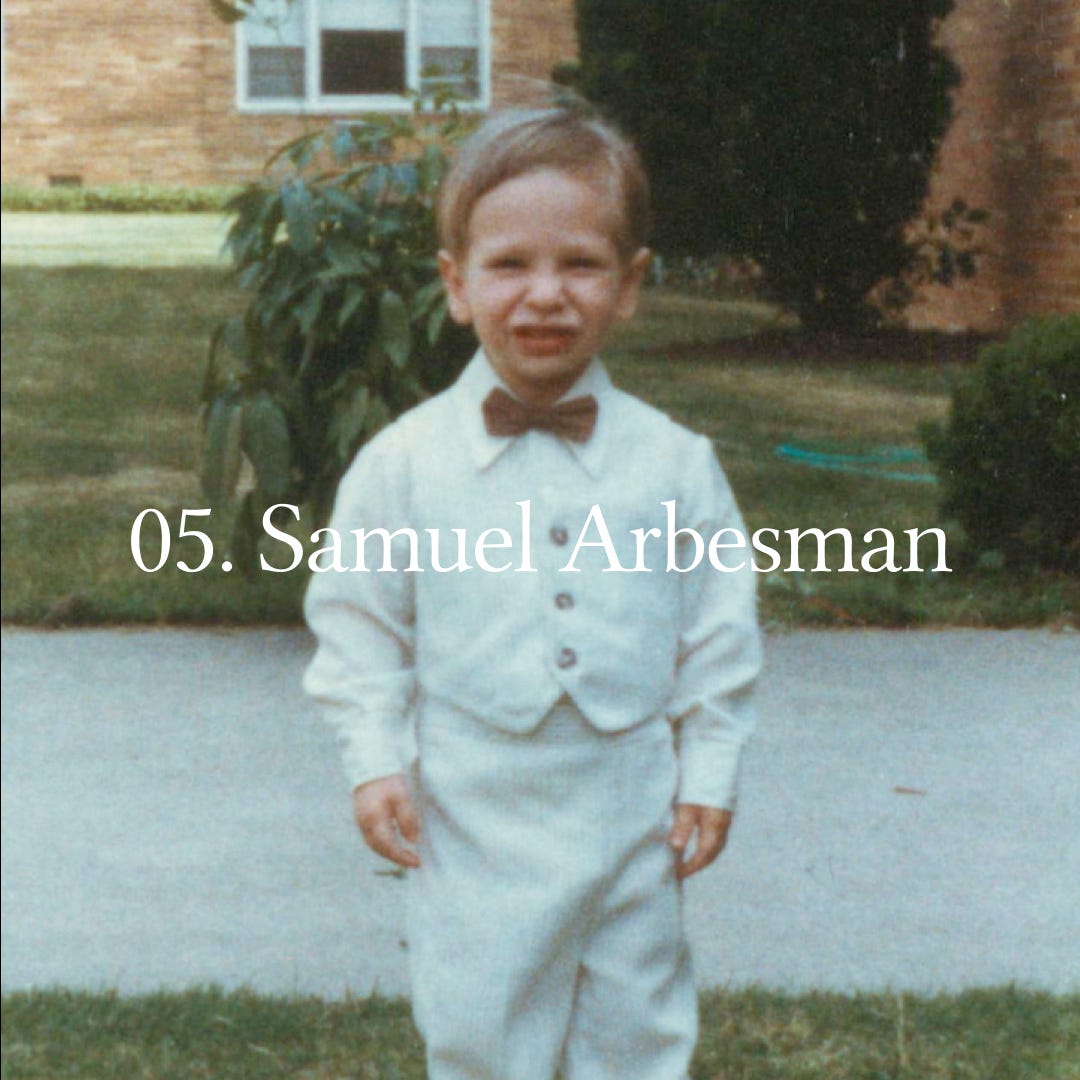
Sane New WorldEP.05 Samuel Arbesman on objectives vs serendipityIn this episode, Sam and I chat about his somewhat unconventional career path that led him to becoming a Scientist In Residence at Lux Capital, how institutions could support more alternative and unconventional roles for thinkers, we talk about objectives vs serendipity when it comes to how we relate with work, and what delightful computing means to us. Enjoy! This is a public episode. If you would like to discuss this with other subscribers or get access to bonus episodes, visit sanenewworld.substack.com
2023-11-0146 min
Meditations with ZoharSamuel Arbesman: Between Knowledge and WonderThis week, Zohar is joined by Sam Arbesman, Scientist in Residence of Lux Capital, and author of the Half-Life of Facts, to talk about the pursuit of knowledge, the sociology and business of science, and the enduring importance of imagination and narrative.
2023-05-241h 12
Meditations with ZoharSamuel Arbesman: Between Knowledge and Wonder S2 E9This week, Zohar is joined by Sam Arbesman, Scientist in Residence of Lux Capital, and author of the Half-Life of Facts, to talk about the pursuit of knowledge, the sociology and business of science, and the enduring importance of imagination and narrative.
2023-05-241h 12
Infinite LoopsJesse Michels — American AlchemyJesse Michels is an investor at Thiel Capital and the creator and host of 'American Alchemy', a Youtube channel dedicated to highlighting the most heretical thinkers and ideas of our time. He joins the show to discuss the transmission theory of consciousness, whether mushrooms are aliens, the reawakening of the Boomers and MUCH more! Important Links: American Alchemy Jesse's Twitter Show Notes: The modern-day Robert Anton Wilson Why Jesse started American Alchemy The transmission theory of consciousness Why mushrooms may have catalysed human civilisation Paradigm shifts and heretical thinking Are mushrooms aliens? Nixon, psychedelics & brainwashing The reawakening...
2023-02-021h 14
Sacred ScienceEdge Cases of the Future: A Conversation with Samuel Arbesman, PhDMany public misunderstandings of scientific knowledge stem from oversimplification. In a complicated world, how can we use complexity to help us understand facts, instead of making them more confusing? One way we try to anticipate the impact of facts is through examining edge cases. The “edge case,” in engineering, is an extreme example used to demonstrate something that could happen and is important to consider, though rare – for example, the various ethical quandaries a self-driving car might find itself in. And a surprising precedent for addressing edge cases comes in the form of the Torah, where ethical quandaries like the ox...
2022-12-121h 01
RiskgamingAlternate Histories and GPT-3"GPT-3 was trained on is so large that the model contains a certain fraction of the actual complexity of the world. But how much is actually inside these models, implicitly embedded within these neural networks?
I decided to test this and see if I could examine the GPT-3 model of the world through the use of counterfactuals. Specifically, I wanted to see if GPT-3 could productively unspool histories of the world if things were slightly different, such as if the outcome of a war were different or a historical figure hadn’t been born. I wanted to see h...
2022-06-1716 min
Investing by the Books#2 Jake Taylor: The Multidisciplinary AllocatorAllocating capital is one of management’s most important jobs. Still, many decisions are suboptimal for shareholders. Why is that? In this episode, Jake Taylor - author of The Rebel Allocator - shares valuable insights on capital allocation and investment strategy. We also talk about biases, pricing power, and how to use a multidisciplinary approach in life and investing. For more info about the podcast, go to the episode page.—————————————————Episode ChaptersIntro(00:23) Intro with Eddie and Niklas(03:18) Charlie Munger calling and movie status(07:02) Feedback on and purpose of the bookCapital Al...
2021-08-101h 17
Top Traders Unplugged145 Systematic Investor Series ft Mark Rzepczynski – June 20th, 2021Mark Rzepczynski returns this week to discuss the recent decline in commodity prices, perceived hawkish comments from the Federal Reserve, trading narratives versus trading price action, the feasibility of Trend Following on options, the increased time & labour of short-term trading, the benefits of huge sample sizes, the differences between trading single stocks versus index futures, how investing rules offset our natural human tendencies, whether Technical Analysis contributes to typical Trend Following strategies, and Mark explains the ‘3 D’s’ of inflation.
You can find Mark’s latest writings here.
If you would like to leave us a voicemail to play on the show...
2021-06-201h 18
Sped up Rationally SpeakingRationally Speaking #167 - Samuel Arbesman on "Why technology is becoming too complex"As the technology we rely on every day becomes increasingly sophisticated, it's getting to the point where it's too complicated to understand -- not just for individual users, but for any human at all. In this episode, Julia talks with complexity scientist Samuel Arbesman, about his new book Overcomplicated: Technology at the Limits of Comprehension, why these unprecedented levels of complexity might be dangerous, and what we should do about it.
Sped up the speakers by ['1.18', '1.0']
2021-01-0348 min
Sped up Rationally SpeakingRationally Speaking #83 - Samuel Arbesman On The Half-Life of FactsHow long does it take for one-half of everything we know about a subject to be proven wrong? Depends on the subject. 45 years, for example, if that subject is cirrhosis or hepatitis. Samuel Arbesman, applied mathematician and author of "The Half-Life of Facts: Why Everything We Know Has an expiration Date", joins Julia and Massimo to talk about the hidden patterns underlying how fast our understanding of science is changing.
Sped up the speakers by ['1.0', '1.07']
2020-12-1444 min
While Daring GreatlyHalf of what you know is wrong — according to ScienceWe tend to think of facts like concrete, a solid foundation. They aren’t. Facts are fluid because our knowledge is always growing and expanding.
“Facts change all the time. Smoking has gone from doctor-recommended to deadly. We used to think the Earth was the center of the universe and that Pluto was a planet. For decades we were convinced that the brontosaurus was a real dinosaur.”
- The Half-Life of Facts: Why Everything We Know Has an Expiration Date by Samuel Arbesman
2020-02-2603 min
Community PulseWhat's In A Name? - the various titles within developer relations (Ep 37)Banana Bread Recipes
Bear:
Preheat oven to 350.
Sift dry ingredients together (honestly, dump in a bowl and fluff with a fork): – 1.5c flour – 1c sugar – 1 tsp baking soda – 1/2 tsp salt
Mash 3 overripe bananas in a bowl.
Beat in 1 egg.
Add 1 tbsp melted butter OR canola oil.
Mix wet ingredients into dry until just combined.
Add 1c “stuff” - chocolate chips and walnuts in my case - just combine.
Bake in a loaf pan 1h15m.
Jeremy: Dry: 2c flour 1/2c sugar 1/2t baking soda 1/2t salt 2t baking powder
Wet: 1c mashed ripe bananas 1 eg...
2019-07-0655 min
Idea MachinesCompounding Ideas with Sam ArbesmanIn this conversation Sam Arbesman and I talk about unlocking cross-disciplinary innovations, long term organizations, combinatorial creativity and much more. As you might expect from someone with Generalist Thinking as a main area of interest, Sam has out-of-the-box insights in a ton of domains and he's amazing at capturing them in tight concepts like "knowledge mining" and "jargon barriers." By day Sam is the Scientist in Residence at Lux Capital. Don't cite me on it but I think he may be the only person with that job title in the world. In the past he's done research...
2019-05-2453 min
The ConversationEpisode 1: Preconceptions in LearningIn our debut episode, I talk to Nicole, a graduate student in the speech-language pathologist at Adelphi University about two readings: Chapter Eight from Samuel Arbesman's The Half-Life of Facts and the Introduction by M. Suzanne Donovan and John D. Bransford in How Students Learn.Coming up next week: Misconceptions! Tweet your questions at us using #askedt503.
2019-01-3041 min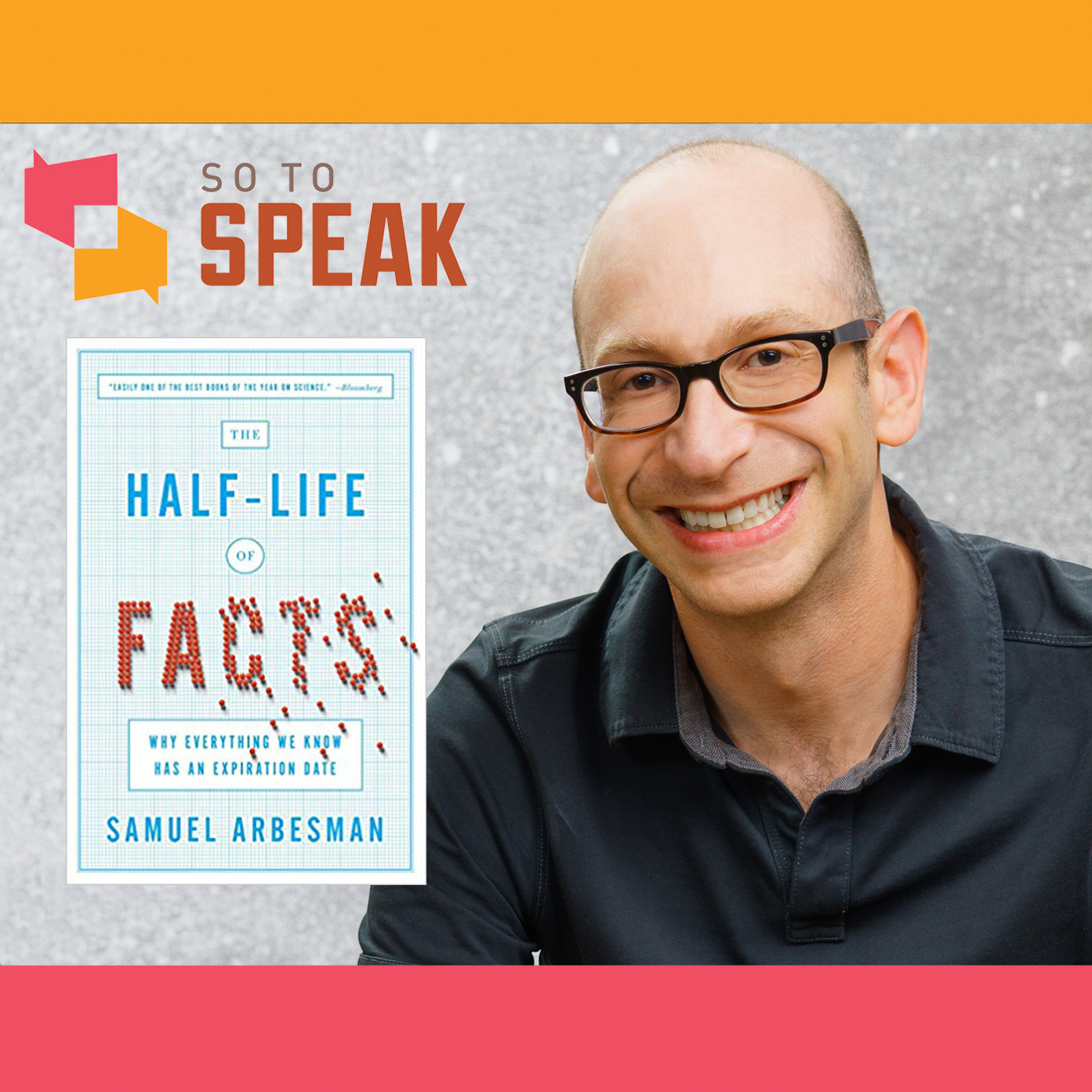
So to Speak: The Free Speech Podcast'The Half-Life of Facts' with Samuel ArbesmanHas every fact we've ever known undergone revision or reversal? It's a provocative and consequential idea, and one that complexity scientist Samuel Arbesman argues has some truth to it — even if he wouldn't state it that strongly. On today's episode of So to Speak: The Free Speech Podcast, we talk with Arbesman about his 2012 book, The Half-Life of Facts: Why Everything We Know Has an Expiration Date. If facts about our world are constantly shifting, shouldn't the protection of free speech — the right to openly question the world and all we believe about it — become even m...
2018-12-1356 min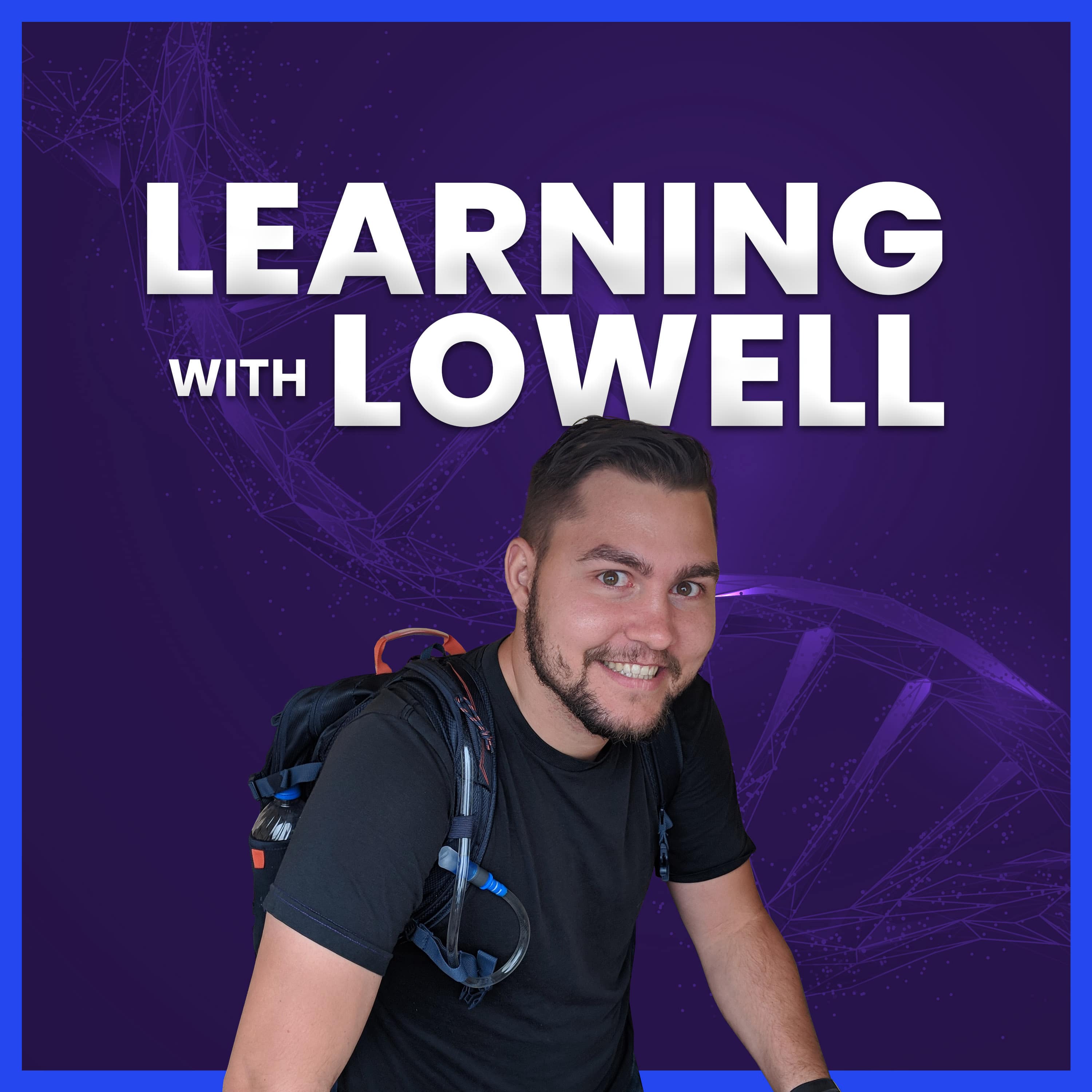
Learning With Lowell37: Lux Capital Scientist in Residence, Award Wining Science Author Dr. Sam Arbesman Discusses Startups, Being a Generalist vs a Specialist, His journey, and Finding Where He BelongsLux Capital Scientist in Residence, what that is like, how he evaluates startups, the big things he focuses on, and his thoughts on being a generalist over being a specialist are just some of the topics we cover in this episode!
Important links
Personal Website
Lux Capital about page
Linkedin Page
All of his writing at Wired
All of his writing at The Atlantic
All of his writing on Medium
Crunchbase
Biography
All of the below can be seen on his website here as well as how to contact him and join his newsletter.
"Samuel Arbesman is a complexity scientist, who...
2018-06-1234 min
Santiago Bilinkis – Futuro en ConstrucciónTemporada 6, Episodio 2: Los trabajos del futuroAcá podés escuchar o descargar el audio del segundo episodio de la sexta temporada de la columna en Basta de Todo, tal como salió al aire el 11 de abril de 2017. En este episodio hablamos sobre los cambios que se vienen al mundo del trabajo y cómo prepararnos para ellos.
TEDxRíodelaPlata
¡Dos charlas de TEDxRíodelaPlata fueron subidas a la plataforma de TED! Acá pueden ver la de Karina Galperín y la de Sebastián Bortnik.
Y acá podrán mirar en vivo el streaming de TED en Español el 25 de a...
2017-04-1137 min
The Knowledge Project#15 Samuel Arbesman: Future-Proof Your KnowledgeSamuel Arbesman is a complexity scientist focusing on the changing nature of science and technology. We discuss learning, reading, and how to optimize both to get the best outcome. Go Premium: Members get early access, ad-free episodes, hand-edited transcripts, searchable transcripts, member-only episodes, and more. Sign up at: https://fs.blog/membership/ Every Sunday our newsletter shares timeless insights and ideas that you can use at work and home. Add it to your inbox: https://fs.blog/newsletter/ Follow Shane on Twitter at: https://twitter.com/ShaneAParrish
...
2016-11-2848 min
Point of InquiryComprehending the Incomprehensible: Samuel Arbesman on Rapidly Accelerating Technology We live in a digital era in which science and technology have revealed new frontiers never before possible. In developing the complicated technologies that permeate our lives, is it possible that humans have failed to grasp the magnitude of the complexity they have created? This week's guest is a complexity scientist, Samuel Arbesman, author of the new book Overcomplicated: Technology at the Limits of Comprehension. Arbesman explains that the rate of technological expansion is growing too quickly for our intellects to keep up, and the dangers o...
2016-11-0726 min
Point of InquiryComprehending the Incomprehensible: Samuel Arbesman on Rapidly Accelerating Technology We live in a digital era in which science and technology have revealed new frontiers never before possible. In developing the complicated technologies that permeate our lives, is it possible that humans have failed to grasp the magnitude of the complexity they have created? This week's guest is a complexity scientist, Samuel Arbesman, author of the new book Overcomplicated: Technology at the Limits of Comprehension. Arbesman explains that the rate of technological expansion is growing too quickly for our intellects to keep up, and the dangers o...
2016-11-0726 min
Rationally Speaking PodcastRationally Speaking #167 - Samuel Arbesman on "Why technology is becoming too complex"As the technology we rely on every day becomes increasingly sophisticated, it's getting to the point where it's too complicated to understand -- not just for individual users, but for any human at all. In this episode, Julia talks with complexity scientist Samuel Arbesman, about his new book Overcomplicated: Technology at the Limits of Comprehension, why these unprecedented levels of complexity might be dangerous, and what we should do about it.
2016-09-0450 min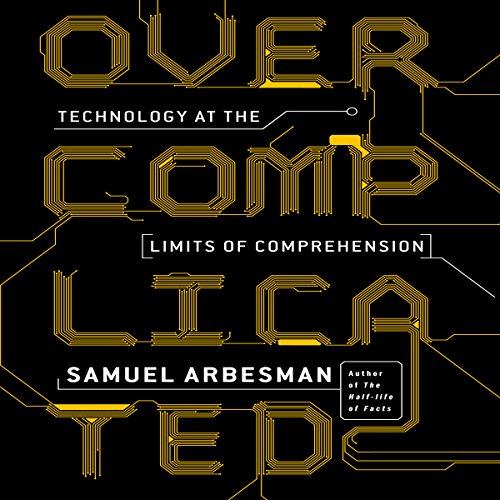
Discover The Full Audiobook Everyone Is Talking About — So Vivid!Overcomplicated by Samuel ArbesmanPlease visithttps://thebookvoice.com/podcasts/2/audible/116805to listen full audiobooks.
Title: Overcomplicated
Author: Samuel Arbesman
Narrator: Sean Pratt
Format: mp3
Length: 4 hrs and 35 mins
Release date: 07-19-16
Ratings: 4 out of 5 stars, 125 ratings
Genres: Technology & Society
Publisher's Summary:
2016-07-194h 35
Rationally Speaking PodcastRationally Speaking #83 - Samuel Arbesman On The Half-Life of FactsHow long does it take for one-half of everything we know about a subject to be proven wrong? Depends on the subject. 45 years, for example, if that subject is cirrhosis or hepatitis. Samuel Arbesman, applied mathematician and author of "The Half-Life of Facts: Why Everything We Know Has an expiration Date", joins Julia and Massimo to talk about the hidden patterns underlying how fast our understanding of science is changing.
2013-03-2545 min
Point of InquirySamuel Arbesman - The Half-Life of FactsHost: Indre Viskontas
Because we live in an uncertain world, we arm ourselves with facts to gain a sense of control and therefore some modicum of comfort. We know that the sun will rise tomorrow even though it disappears tonight. But what happens when facts, those bits of information that we believed captured some fundamental truth about our world, are shown to be no longer true? With the exponential rise in our knowledge about our universe comes a tsunami of data overturning what we once thought we knew with complete certainty. Are there patterns that emerge from...
2012-12-0440 min
Point of InquirySamuel Arbesman - The Half-Life of FactsHost: Indre Viskontas
Because we live in an uncertain world, we arm ourselves with facts to gain a sense of control and therefore some modicum of comfort. We know that the sun will rise tomorrow even though it disappears tonight. But what happens when facts, those bits of information that we believed captured some fundamental truth about our world, are shown to be no longer true? With the exponential rise in our knowledge about our universe comes a tsunami of data overturning what we once thought we knew with complete certainty. Are there patterns that emerge from...
2012-12-0440 min